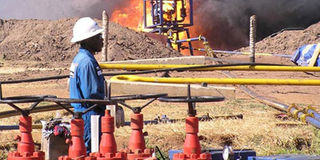Supplier database to promote transparency in oil, gas sector

An employee watches a flaring experiment at one of the wells in the Albertine Graben. Firms interested in offering services in the sector can access information from the newly launched database. FILE PHOTO
What you need to know:
- Local. The More than half of the firms up on the database are registered in Uganda.
KAMPALA. The Petroleum Authority of Uganda (PAU), the body charged with regulating and monitoring Uganda’s nascent petroleum industry, yesterday launched the National Supplier Database (NSD) that will guide and serve as a roster for local and international service providers for the oil and gas sector.
The NSD, which PAU executive director Ernest Rubondo revealed had so far attracted 753 entities applying to be included, was launched alongside the PAU‘s website on which the roster will be hosted and open for viewing by anyone.
While speaking at the NSD launch at the ministry of Energy offices in Kampala, Mr Rubondo said: “Uganda is not the first country to run a system of this nature,” and PAU benchmarked the system on other countries such as Malaysia and Norway on its workability.
Out of the 753 firms that have so far expressed interest for listing on the NSD, Mr Rubondo revealed that 501 are registered in Uganda while 253 are international companies registered in, among others, China, Australia, Germany, France, Kenya, Tanzania, Italy, Norkay, Turkey, India, United Arab Emirates and United Kingdom.
“For entities registered here we are working closely with the Uganda Registration Services Bureau, National Social Security Fund and Uganda Revenue Authority to verify the information they provided to us regarding ownership, proof of registration, tax compliance and other social security requirements,” he said.
He added: “For international entities we are working with their embassies here to validate their information from back home.”
Already, Mr Rubondo, indicated that 293 firms which applied during the first deadline (last year) until another was issued in April this year have been verified and qualified for listing in the NSD. More names will be added on the roster subject to verification of information provided.
PAU is established by the Petroleum (Exploration, Development and Production) Act 2013, to regulate the sector including closely scrutinising operations of the oil companies. Currently only France’s Total E&P, Anglo-Irish Tullow Oil and China’s Cnooc are licenced to operate in Uganda.
Local content
The establishment of the NSD comes against backdrop of ongoing debate about local content and specifically how local players are poised to benefit from the sector as the country moves to the next stage of development and consequently commercial production expected to start earliest December 2020, an ambitious date that is debatable, given the amount of work required on the ground.
The sector during the last decade, in the first phase of exploration, saw investments of up to $3.2b (Shs11 trillion) although local contractor raked in only 28 per cent of that or roughly $900m (Shs3b).
This was mainly in logistics, clearing and forwarding, supply chain management, catering services, air transport services (light aircraft carriers to the field) and camp management services.
Ms Peninah Aheebwa, the PAU director technical support services, reiterated that certain areas in the sector such as transport and security will remain ring-fenced to local service providers but will be opened up “in the event that an oil company proves that either certain standards cannot be met or there is not local player to work with.”
Total E&P Uganda general manager Adewale Fayemi, as a first step, said the NSD will offer some visibility to possible [local] companies to work with “and this will go a long way in enhancing local capacity.”
Following last year’s awarding of production licences to Total, Tullow, and Cnooc (much earlier in 2013), which are now undertaking technical studies for development of the development of the 14 oil fields in the Albertine Graben, it is estimated that an additional $8b (Shs27 trillion) will be invested in Uganda.
On the sidelines, the oil companies and government are working on development of a $3.5b (Shs11 trillion) crude oil pipeline to Tanzania while government is independently nursing ambitions to construct a $4b (Shs13 trillion) oil refinery.




